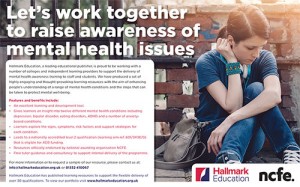Mental health was a key theme of the recent AoC annual conference and we welcome the spotlight that it has shone on both student and staff mental health.
One of the key themes of the Association of Colleges annual conference this year was mental health. Indeed, the AoC has made student and staff mental health a priority both nationally and locally. This is encouraging news and we welcome the attention the AoC is bringing to this important issue.
Sadly, evidence suggests that mental ill-health among students is on the increase. In June 2015, the AoC conducted a survey of colleges regarding the prevalence of mental health issues in colleges and the support that is in place. The survey was sent to principals, special educational needs contacts and student support contacts in colleges in England (123 colleges responded).
The survey revealed some interesting but worrying results:
• 66% of respondents said that the number of students with mental health difficulties had ‘significantly increased’ in the past three years with a further 20% saying they had ‘slightly increased’.
• Moreover, 75% felt that their college had ‘significant numbers’ of students who had undisclosed mental health difficulties.
• 75% felt that pressures of social media were having an impact on students’ mental health. Other reasons given by colleges for the possible increase in the number of students with mental health conditions were ‘exam pressures’ (60%) and ‘financial concerns’ (61%).
• All respondents reported having students with depression, anxiety, and those who were self-harming. 97% reported having students who have experienced psychosis.
• 43% of respondents had no full-time counsellor or mental health support worker and 55% had experienced cutbacks to the support they could offer over the past three years.
• 55% reported a ‘good’ or ‘very good’ relationship with Child and Adolescent Mental Health Services (CAMHS). 60% reported that their relationship with local adult mental health services were only ‘fair’ or ‘not very good’/’non-existent’
• Only 19% said that they were ‘always’ able to have ‘timely referrals’ of their students to primary and secondary services outside the college.
• Only 35% of respondents reported having a mental health policy.
• The majority of colleges (69-75%) reported that only some front-line staff (e.g. reception staff/security staff/first aiders), teaching staff and other staff had been given mental health training.
Source: AoC (June 2015) Mental Health and Well-Being Survey
As a result of its findings, one of the AoCs key recommendations is that there should be ‘a college wide approach whereby mental health is seen as everyone’s responsibility and all staff (teaching and non-teaching) receive mental health training’.
Hallmark Education has worked with a number of further education colleges and private training providers to raise awareness of mental health issues and the steps that can be taken to protect mental well-being. For our part, we have developed a set of highly-quality learning resources that give staff and students an insight into twelve different mental health conditions, including depression, stress and anxiety, eating disorders and ADHD. Candidates explore the signs, symptoms, risk factors and support strategies for each condition.
Furthermore, we have written our resources to meet the requirements of a qualification in mental health awareness that is accredited by the national awarding organisation NCFE (learning aim reference: 601/3438/0). The great news is this qualification is eligible for AEB funding, so colleges have been able to provide this course to their staff on a distance learning basis and draw down funding to cover the costs of running the programme.
If you would like to find out more, please get in touch.

